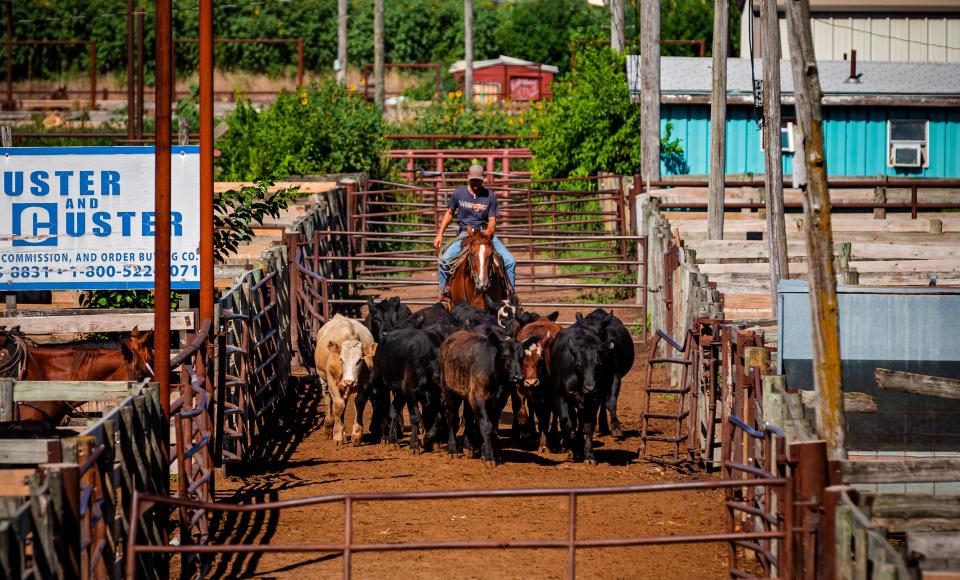Congressional panel hears about workforce issues in 'heartland' Oklahoma
Oklahoma small business owners on Tuesday described their challenges in hiring workers and coping with inflation, as a Republican-led congressional committee held a field hearing in Yukon to assess the economy in one American "heartland" state.
“The lack of workforce is the root cause of all our problems today," Chuck Mills, president of the Mills Machine Co. in Shawnee, told the House Ways and Means Committee.
The committee, which has jurisdiction over tax and trade policy and entitlement programs, sought input from Oklahomans about economic conditions and the role played by Washington. It was the second field hearing held this year by the committee, which was in West Virginia last month.
The hearing on Tuesday at times had the flavor of a partisan road show, with the chairman, Rep. Jason Smith, R-Missouri, warning that people in the heartland should expect a budget from President Joe Biden “that continues Washington’s assault on their way of life.”
The top Democrat on the panel, Massachusetts Rep. Richard Neal, said Republicans “want to give yet another handout to the top 1%, and Democrats want to target benefits to workers and their families.”
More:How Oklahoma leaders plan to fix high-tech workforce shortage
The witnesses, however, stuck to talking about their areas of expertise rather than politics.
Rep. Kevin Hern, R-Tulsa, is a member of the committee, which is now in GOP control since Republicans won a majority of the House in November. Oklahoma Rep. Frank Lucas, R-Cheyenne, is not a member of the panel but sat in and asked some questions.
Here are some takeaways from the hearing, which was held at Express Clydesdales, an historic barn for the prized horses affiliated with the Oklahoma City company Express Employment Professionals.
Problems finding workers
Mills and other witnesses said hiring had become a major headache. It is tough, he said, just getting applicants to show up for an interview.
Mills said he couldn’t explain it.
More:Forbes said Oklahoma was a bottom 10 state to start a business. Is it really?
“We had some of that problem before, but it’s gotten way worse … I don’t know what it is personally,” he said.
Bryant Jackson, owner of Route 66 Meat Processing, in Sayre, said some people who do show up for an interview don’t show up for the first day of work. Then he will sometimes receive a call that the person had filed for government benefits and claimed to have been laid off.
To illustrate the turnover, Jackson said he sent out four times as many W-2 tax forms last year as he had current staff members.
Shiloh Kantz, executive director of the Oklahoma Policy Institute, which advocates for poverty programs, said many potential workers don’t have child care available, and that a large percentage of employers don’t offer paid leave.
Inflation pressures
Joe Brevetti, managing member of Charter Oak Production Co., a privately held oil and natural gas producer, said the cost of drilling and completing an average well has jumped 30% in the past year,
Jackson said the cost of feed and fertilizer had reduced profits in the beef industry, and he also noted the impact it was having on low-income people who had lost purchasing power.
More:Following the latest downturn, Oklahoma may never see the same level of oil-field workers again
Mills said, “Prior to the pandemic, we had predictable price increases, 3% to 3.5% per year. In 2021, we were hammered with compounding price increases for our raw materials. In January 2021, our raw materials increased by 25%.”
Government impact
Comments from witnesses about the impact of Washington policies varied.
Kantz highlighted the benefits of the Affordable Care Act and the Medicaid expansion — an optional part of the ACA — approved by Oklahomans in 2020. She also praised pandemic relief programs and policies, including the child tax credit expansion and emergency rent assistance.
Mills and Jackson praised the Paycheck Protection Program, which helped small employers retain workers in the early days of the pandemic.
“It worked,” Mills said.
But some witnesses complained about government regulations.
Kelli Payne, a farmer and rancher from Mustang and former president of the Oklahoma National Stockyards, said the new Waters of the United States rule and the Endangered Species Act listing of the Lesser Prairie Chicken were overly restrictive.
Brevetti said EPA rules on methane emissions were too burdensome and that the Biden administration had slowed the permitting process for drilling, even on private land.
The 'heartland'

Rep. Linda Sanchez, D-California, took issue with all the talk about the heartland and the nature of the people there.
“An earlier colleague mentioned real Americans in the heartland,”Sanchez said. “And I want to assure people that the people I represent in my district are no less real Americans, they’re no less resilient, they’re no less hard working towards trying to realize the American dream.”
Lucas replied, “And there’s a lot of descendants of Okies in California.”
This article originally appeared on Oklahoman: Oklahoma business owners describe problems getting workers to show up

